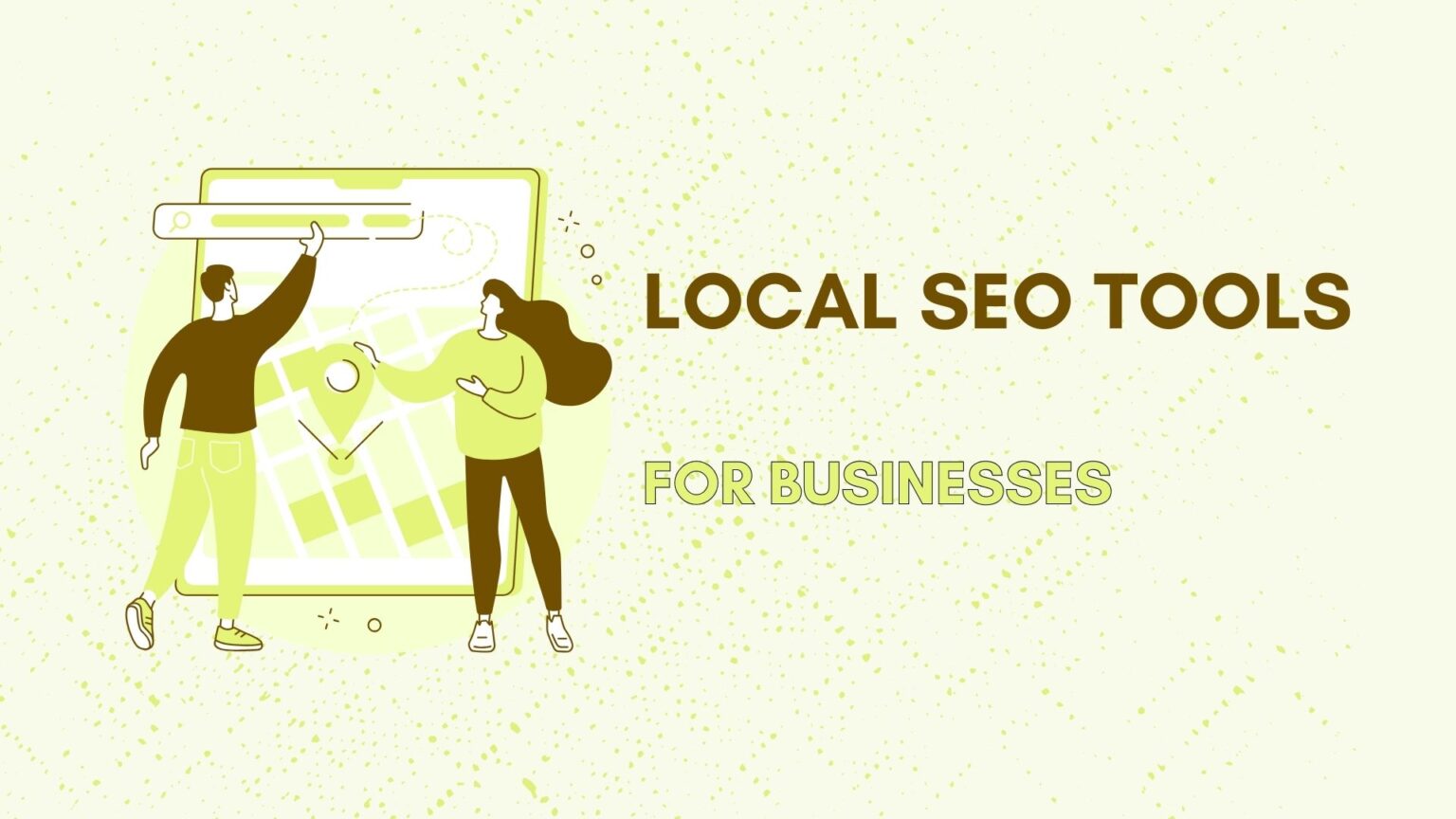Your local online presence plays a major role in whether customers choose your business or your competitor’s. In fact, 76% of smartphone users who search for something nearby visit a business within 24 hours.
Let’s explore the best local SEO tools to boost your business. There are powerful tools to help you track rankings and optimize your Google Business Profile.
1. Google Business Profile
Anyone who works in local SEO is very familiar with Google Business Profile (previously Google My Business). It is an amazing tool for local businesses.
Google Business Profile allows you to manage how your business shows up on Google Search and Maps, and the best part is, it’s completely free.
Having a verified Business Profile helps people find your business and builds trust. If you can create a Google account and fill in your business details, you can start optimizing your presence online. According to a Statista survey, customers are 2.7 times more likely to trust a business with a complete Google Business Profile on Search and Maps.

Benefits of Google Business Profile
Using a Google Business Profile is one of the most effective ways to improve your local SEO and attract nearby customers. For example, when someone searches for a service “near me,” your business can appear in the coveted local 3-pack at the top of Google Maps and Search. This is huge for attracting new customers without spending a dime on ads.
You can easily update information. You can even post photos, videos, and updates about offers or events. By keeping your business information complete and accurate, you make it easier for Google to match your business to relevant searches.
Limitations
Google Business Profile isn’t fully under your control. Anyone can suggest edits to your listing, and it takes time to fix misinformation. Negative reviews can also feel stressful because they’re very public and can impact your reputation, especially if your business is new.
You need to regularly update info, post content, and monitor reviews to keep your listing effective.
2. Google Analytics 4 (GA4)
Google Analytics 4 is a powerful analytics platform that helps you understand how people interact with your website or app. GA4 is built on an event-based model, which means every user action is tracked as an event. If you can create a GA4 property and add your tracking code, you can start gathering insights.

Benefits of Google Analytics 4
GA4’s geographic and demographic reporting helps you identify which cities, regions, or neighborhoods are driving the most traffic. By linking GA4 with Google Search Console and using UTM parameters on your Google Business Profile links, you can measure the direct impact of your local listings on website traffic.
Enhanced Measurement automatically tracks key events like outbound clicks, site search, and video engagement. Custom events and conversions can be configured to track high-value local actions, while engagement metrics such as “Engaged Sessions” reveal how effectively your content resonates with local visitors.
In addition, GA4’s custom reports and audience segments allow you to monitor local performance, optimize underperforming pages, and improve the mobile experience.
Limitations
GA4 has a steep learning curve. Setting up custom events for local SEO tracking, like phone clicks or map interactions, isn’t always intuitive.
Also, GA4 doesn’t provide detailed keyword data for organic searches anymore. You can see traffic from “Organic Search,” but you can’t directly know which local keywords brought visitors to my site. For that, I still have to rely on Google Search Console.
3. GMBapi
GMBapi.com is a local SEO platform built with agencies and multi-location brands in mind. While it is best known for its deep Google Business Profile capabilities, it is not entirely limited to GBP data. The platform has expanded to support Apple Business Connect and citation management, making it a broader solution for managing local presence across multiple ecosystems from a single source of truth: your GBPs.
(Source: GMBapi.com)
Benefits of GMBapi.com
For agencies, scalability and efficiency are everything, and that’s where GMBapi.com really stands out. The platform allows agencies to manage dozens or hundreds of locations without the manual overhead that often comes with local SEO. Bulk updates for services, categories, attributes, posts, and photos make large-scale optimizations realistic instead of painful. At the same time, local stakeholders can still edit their Google Business Profiles directly, ensuring on-the-ground teams remain flexible without breaking central governance.
GMBapi.com also offers credit-free geo-grid rank tracking, which is a major advantage for agencies. Unlike tools that charge per scan or grid, agencies can monitor local visibility continuously without worrying about credit consumption. This makes proactive optimization, testing, and reporting far more predictable and scalable.
Another strong USP is its AI-driven tracking and insights. The platform helps agencies monitor changes in visibility, engagement, and competitive position, while highlighting anomalies that may require action. On top of this, agencies can automate monthly performance reports sent directly to individual location owners, reducing manual reporting while keeping local teams informed and aligned. This allows account managers to focus on strategy rather than recurring operational tasks.
Reputation management is another area where GMBapi.com performs exceptionally well. Its deleted review monitoring is best in class, giving agencies clear visibility into when and where reviews disappear. This makes it easier to spot patterns, escalate issues, and protect clients from unexplained review losses. Combined with centralized review monitoring and response workflows, it becomes a powerful reputation management system for multi-location brands.
With the addition of Apple Business Connect, agencies can manage visibility beyond Google, which is increasingly relevant as Apple Maps adoption grows across mobile and in-car navigation. The citations extension further strengthens local authority by helping agencies maintain consistent business data across key directories.
Limitations
While GMBapi.com covers Google Business Profile management, Apple Business Connect, citations, local rank tracking, and reputation management extremely well, it is not designed to replace full-suite SEO platforms like Ahrefs or Semrush. Agencies will still need complementary tools for technical SEO audits, backlink analysis, and broader keyword research.
That said, for agencies focused on local visibility, operational scale, and reputation control, GMBapi.com fits naturally into a modern local SEO stack.
4. Google Search Console (GSC)
Google Search Console is a free tool from Google that helps you monitor, maintain, and troubleshoot your website’s presence in Google Search results.
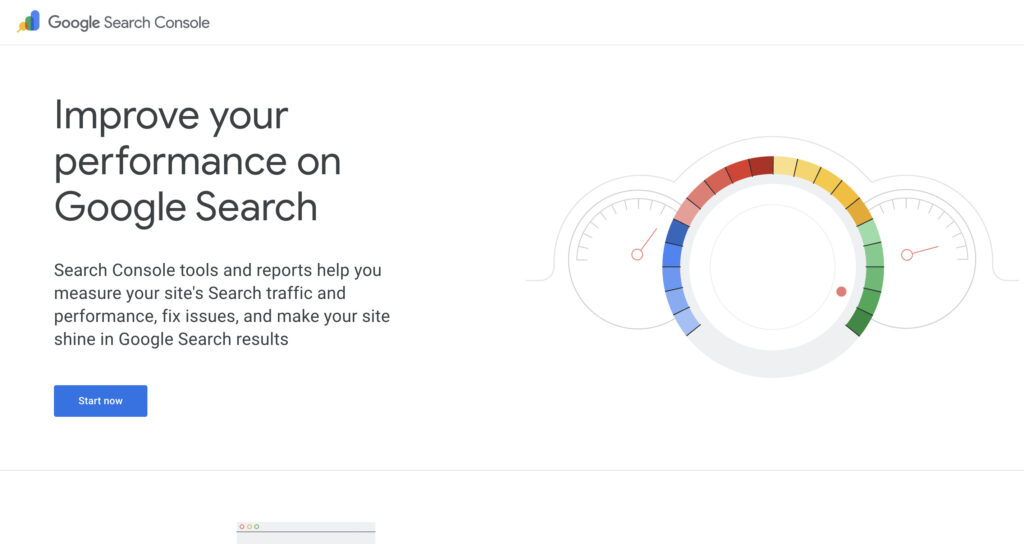
Benefits of Google Search Console
With GSC, you can see the exact keywords people use to find your website. Being able to filter this data by city or region has been a game-changer for local SEO.
The performance reports that show clicks, impressions, CTR, and average position are really amazing. Additionally, the index coverage reports help ensure that every important service page or location-specific landing page is actually being discovered by Google.
GSC will notify you if there are broken links, mobile usability problems, or indexing errors. This direct line to Google makes it easier to keep your website healthy and visible. We also find the links report helpful for monitoring local backlinks from directories, news sites, or community organizations.
Limitations
However, GSC has limited competitor analysis. You can only see your own data, so you have no direct insights into which keywords or backlinks the competitors are using. For that, consider additional paid SEO tools.
Besides, GSC only covers Google Search, and you won’t get any visibility into performance on other search engines like Bing and DuckDuckGo. Historical data is also limited to around 16 months.
For any startup or small business, Google Business Profile is the most critical. Paired with Google Search Console for website performance insights and Google Analytics for understanding customer behavior, this trifecta provides a strong foundation.
New GBP features like AI-powered review summaries, WhatsApp integration, and video uploads make it more essential for local visibility.
5. Ahrefs
Ahrefs is a premium, all-in-one SEO toolset that provides deep insights into backlinks, keyword rankings, and competitor performance. It’s widely used by large-scale SEO professionals, and many of its features are extremely helpful for local businesses. Ahrefs can help you understand your local market and improve your search visibility.

Benefits of Ahrefs
Ahrefs offers outstanding backlink analysis. You can see which sites are linking to your competitors, including local directories, news outlets, and community pages. From there, you will explore clear opportunities for your own link building. Monitoring your own backlink profile is also easy. You can quickly spot spammy links from Ahrefs reports.
Ahrefs’ keyword research capabilities are very useful. Being able to filter searches by city or region helps find highly specific local keywords that people in your service area are actually searching for. The tool also identifies question-based queries, and you can create content that answers local customers’ questions.
Besides, you can view which pages and keywords are driving traffic to your competitors. The rank tracker is also excellent, which allows you to follow your keyword rankings by city.
Limitations
Ahrefs is quite expensive for small businesses or startups. And to get meaningful insights from Ahrefs, you need a solid understanding of SEO concepts. The interface is powerful but can be overwhelming at first.
6. BrightLocal
BrightLocal is a specialized platform built specifically for local SEO. It helps businesses, agencies, and consultants manage and improve their visibility in local search results.

Benefits of BrightLocal
BrightLocal offers the Local Search Grid, which shows where my business ranks on Google Maps and in organic search across a specific area. Seeing my rankings visually on a map makes it so much easier to understand my local visibility.
The Citation Tracker finds all the sites where your business is listed, flags inconsistencies in your NAP (Name, Address, Phone Number), and gives actionable steps to fix them. Besides, you can monitor reviews from multiple platforms, respond directly from the dashboard, and generate new reviews through email and SMS campaigns.
BrightLocal’s platform is designed for multi-location businesses and agencies. I can manage several locations from a single account and generate professional, white-label reports for clients. It’s affordable, intuitive, and for the needs of local businesses.
Limitations
BrightLocal is a specialist tool, and it doesn’t offer comprehensive backlink analysis, technical SEO audits, or broad keyword research. There’s also a small learning curve for beginners.
7. Semrush Local
You can get Semrush Local, or you can use it as part of a full Semrush subscription that gives you access to a suite of SEO, local marketing, and analytics tools all in one place.

Benefits of Semrush Local
Semrush Local is a powerful suite of tools that helps businesses improve their local SEO. From managing your Google Business Profile to tracking local map rankings and handling reviews, it gives you everything you need to boost visibility and attract more customers.
Semrush Local streamlines tasks. Listing management automatically distributes your business information to top directories like Google, Bing, Facebook, and Yelp. This ensures the info is accurate and consistent across the web.
The AI-powered review management allows for getting instant suggestions for replies and using auto-responses. The Map Rank Tracker is also useful. Being able to see where your site ranks on Google Maps for specific keywords and down to the street or neighborhood level gives clear insights into how the local SEO efforts are performing.
Limitations
While the automation is helpful, there’s still a learning curve to understanding all the features and setting them up. Semrush may feel a bit overwhelming at first because there’s so much data and functionality packed into the platform.
In addition, some of the AI suggestions for replies can feel a bit generic at times. You still need to personalize responses.
8. Moz Local
It all includes the tools you need to manage your business listings, respond to reviews, and monitor your local SEO performance. Moz Local helps you ensure accurate and consistent business information across directories, social media, and Google Business Profile, all from a single platform.
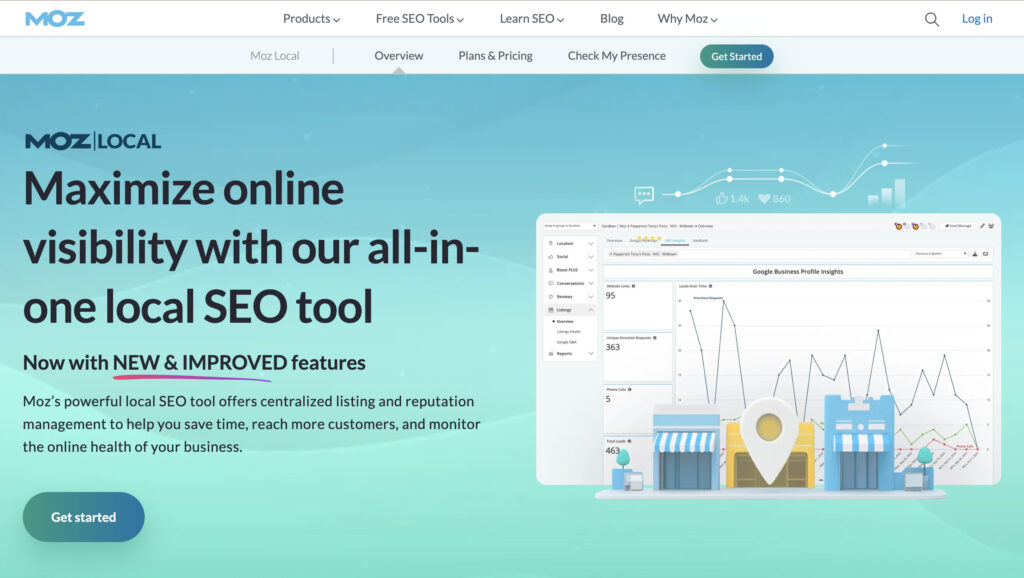
Benefits of Moz Local
Moz Local simplifies listing management. It automatically syncs the business’s Name, Address, and Phone number across major directories and data aggregators, which has saved hours of manual updates. The platform also actively monitors duplicate listings and helps suppress them.
The centralized review management allows you to read and respond to reviews from Google, Yelp, Facebook, and more. The AI-suggested reply templates make responding faster.
On Moz Local, the GeoRank tracking feature shows how your business ranks for target keywords in specific neighborhoods. Also, the platform integrates social media management, letting me schedule posts across multiple channels.
Limitations
Moz Local doesn’t offer some of the advanced local SEO features found in competitors like Semrush Local. The platform also doesn’t cover every niche or industry-specific directory.
9. Yext
Yext is a cloud-based platform that centralizes local listings, reviews, and location data, giving you full control over your business presence.
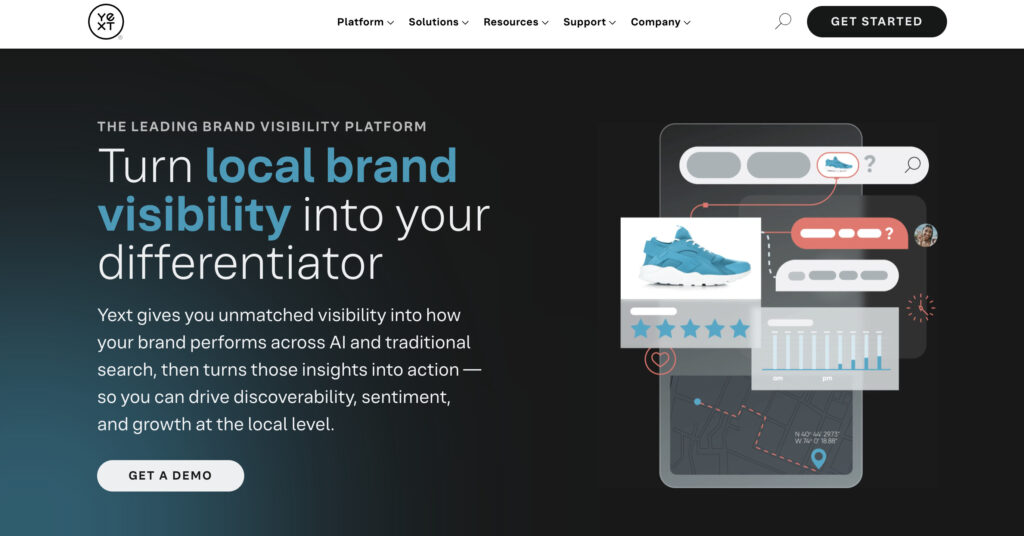
Benefits of Yext
Using Yext, you’ll get the sheer scale and speed of its Knowledge Network. Any update to your business information gets pushed to platforms, including Google, Bing, Facebook, Apple Maps, and Waze, almost instantly.
Instead of logging into multiple platforms, you can monitor and respond to reviews from Google, Facebook, and other channels in one place. The ability to add rich content – photos, videos, menus, and promotions – also makes my listings more engaging and helps my business stand out in search results.
The AI-powered Scout and competitive tracking tools show how your business performs relative to local competitors. For large brands or franchises, Yext’s scalability is invaluable; managing hundreds of locations from a single dashboard would be nearly impossible otherwise.
Limitations
Yext is one of the more expensive local SEO tools, especially if you manage multiple locations. Also, you still need platforms like Semrush or Ahrefs for keyword research, backlink tracking, and technical audits.
10. Whitespark
Whitespark is not an all-in-one SEO suite, but that’s actually the point. The platform is hyper-focused on local businesses.

Benefits of Whitespark
Whitespark’s tools are built specifically for local businesses. The Local Rank Tracker, for instance, gives detailed, location-specific keyword rankings on both Google Search and Maps. You’ll love the Local Search Grid feature because it visually shows which areas your business is performing well in, as well as which need attention.
The Local Citation Finder is excellent for discovering new citation opportunities and tracking the ones you already have. The Reputation Builder tool is also great, which automates review collection and makes it easy to respond to customers.
Finally, you don’t have to be an SEO expert to use it effectively. The interface is clean and easy to navigate. Overall, it’s a user-friendly platform for local SEO.
Limitations
Note, if you’re also targeting national or global keywords, you’ll still need additional tools for backlink analysis, technical SEO audits, or broader keyword research.
11. Local Falcon
Local Falcon is one of the best tools for truly understanding local search visibility. It focuses on visualizing your local rankings in Google Maps, Apple Maps, and even AI-driven search platforms. Its geo-grid format gives you a bird’s-eye view of where your business stands across your service area.

Benefits of Local Falcon
Seeing a heatmap of your rankings across different blocks and neighborhoods is eye-opening compared to the usual “you rank #7 in this city” type of reporting. It helps understand where your business is strong and where competitors are edging you out.
The “Share of Local Voice” (SoLV) metric simplifies visibility into a single, easy-to-understand percentage to measure progress over time.
The Falcon AI and Falcon Assist features actually analyze your data and make actionable recommendations. The competitive analysis is another big plus. Running side-by-side scans against competitors and seeing how they perform in the same neighborhoods helps spot opportunities you wouldn’t have noticed otherwise.
Limitations
While Local Falcon is excellent for local rank tracking, it doesn’t include other features like citation management, review monitoring, or organic keyword tracking. If you want a complete SEO toolkit, you’ll definitely need to combine it with other software.
Also, if you’re brand new to local SEO, the amount of data and visualizations can feel a bit overwhelming at first. You really need to understand local SEO basics to make the most of the insights. And since it doesn’t track organic rankings (just Maps and AI visibility), I still have to use a second tool for my website SEO.
12. Google Trends
Have you missed anything? It’s Google Trends. Yes, it’s not a full-featured SEO platform, but it’s one of the amazing tools for local SEO.
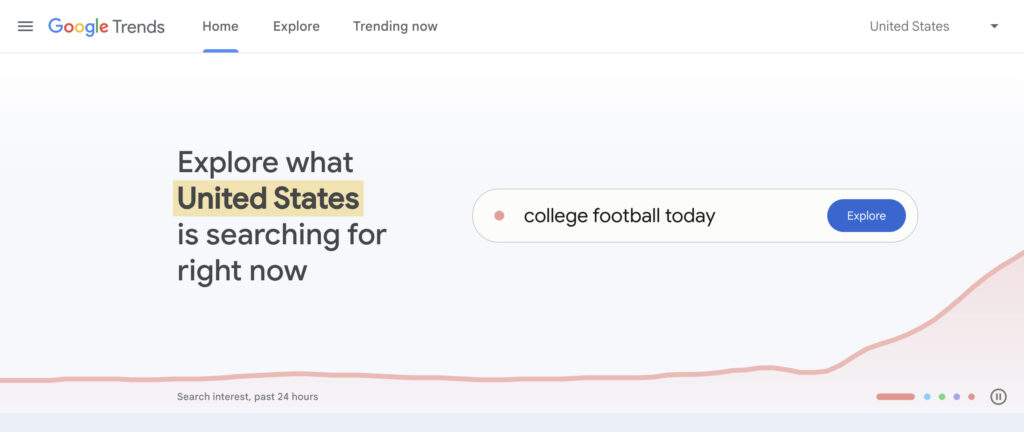
Benefits of Google Trends
Google Trends is easy to use. It offers insights into what people are searching for in your area. You can filter search interest down to a country, state, or metro area. Moreover, the ability to compare keywords side by side is great. Use it for things like “homes for sale in [city]” vs. “[city] real estate,” and it immediately shows you which phrase people are more likely to type into Google.
The “Rising” and “Breakout” queries are basically early signals of what’s trending. Catching those early means you can create content before competitors jump on it.
And of course, the fact that it’s completely free. Google Trends is completely open to everyone. For small businesses with tight budgets, this makes it one of the easiest entry points into local SEO research.
Limitations
Keep in mind that Google Trends doesn’t give you actual search volumes. Everything is relative on a scale of 0 to 100. That makes it hard to know whether a spike means 500 searches or 50,000.
Also, it excludes low-volume queries. If you’re in a small town or a very niche business, Trends may not show your keywords at all, even though people are searching. It’s also limited to Google data only. It doesn’t tell you anything about searches happening on Bing, DuckDuckGo, or even searches that happen directly in Google Maps.
Still, I still find Google Trends incredibly valuable. It’s quick, free, and surprisingly powerful when you use it to guide your content and ad timing.
13. AnswerThePublic
With AnswerThePublic, you get a direct window into what your customers are actually typing into search engines. It’s not a traditional SEO platform. It’s one of the best tools for uncovering raw search intent and turning it into content ideas that actually resonate with local audiences.
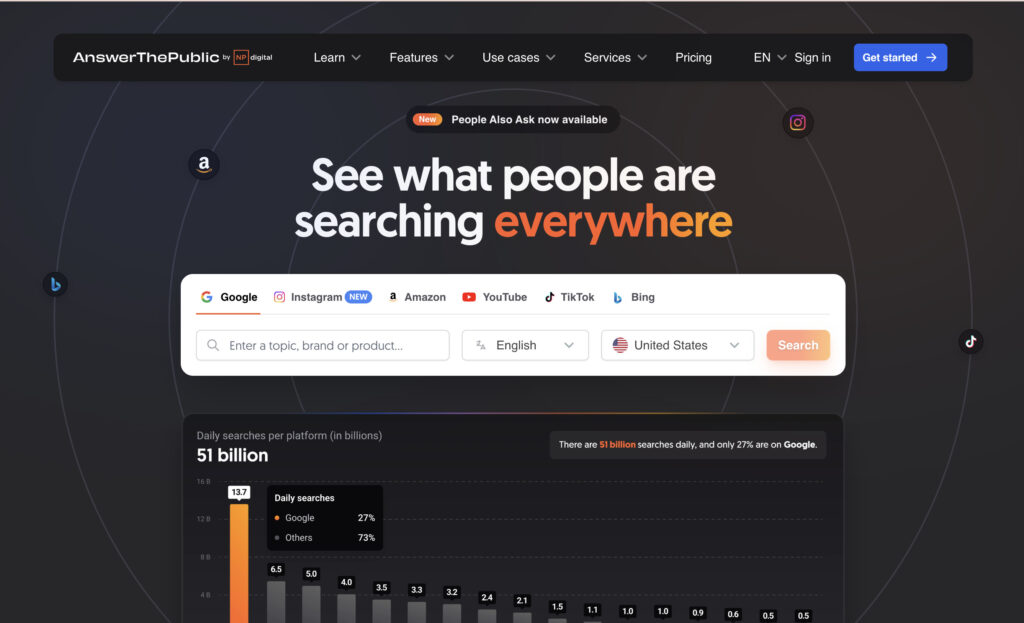
Benefits of AnswerThePublic
AnswerThePublic listens in on autocomplete data and instantly gives the real questions people are asking. For local SEO, this is useful. By adding a location to your keyword, you can see specific phrases and comparisons that local people care about. It’s much easier to write relevant content when I know exactly what customers are asking.
The visual “search wheel” is another standout. Instead of staring at a long spreadsheet of keywords, you can see queries grouped by “who, what, where, when, why” and more. It sparks content ideas quickly and helps plan blogs and FAQs. You can also discover quirky, long-tail keywords. Those are gold because they’re highly specific, easier to rank for, and they often convert better.
For small businesses or startups, you can get a lot of insights without spending a dime with its free version. And if you upgrade, it’s still relatively affordable.
Limitations
While you can filter by country, it doesn’t always get granular enough for hyper-local businesses. For example, if I want search insights just for a single metro area or small town, the data can be a bit too broad to be useful.
It’s also important to remember that this isn’t a full SEO platform. It won’t track the local rankings, manage citations, or help get reviews. It’s purely a brainstorming and research tool.
AnswerThePublic is an invaluable addition to your SEO toolkit. It’s the perfect tool for uncovering fresh, intent-driven content ideas.
Expert opinion
No matter how niche or mainstream your market is, great content remains a significant focus for SEO.

Founder of LSEO
Conclusion
We hope this guide will help you choose the right solutions to strengthen your online presence and stay ahead of the competition. Revisit this page from time to time; we’ll keep it updated with the latest tools and strategies to support your local SEO success.
Frequently Asked Questions


